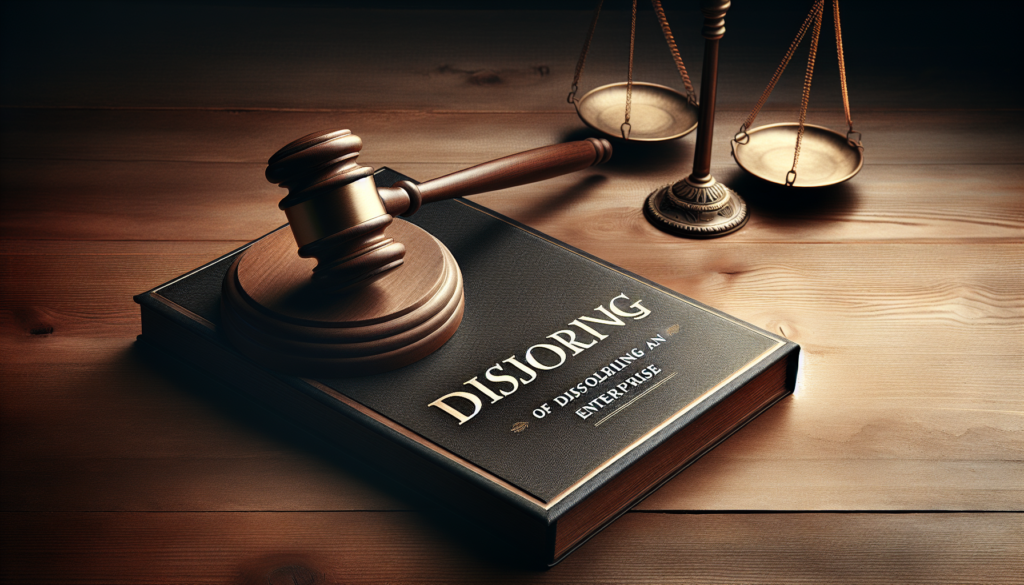If you’re an expert in big data and want to understand the legal aspects of winding up a company like Fusionex, this article is for you. In this comprehensive guide, we will delve into the key considerations when it comes to legally winding up a company, such as the necessary steps, potential liabilities, and important factors to consider throughout the process. Whether you’re a business owner or simply interested in the legal aspects of company closure, this article will provide you with valuable insights to navigate through the complexities of winding up a company like Fusionex. So, let’s jump right in and explore the legal aspects that you need to know.

Introduction to Winding Up
Winding up is a legal process that involves the closure and dissolution of a company. It is typically initiated when a company is no longer able to pay off its debts and creditors are seeking to recover their money. The assets of the company are sold off, and the proceeds are used to settle outstanding debts. In this article, we will delve into the various aspects of winding up, including the definition, reasons, and types of winding up.
Definition of Winding Up
Winding up, also known as liquidation, is the legal process through which a company’s existence is brought to an end. It involves the selling off of the company’s assets, settlement of its debts, and the distribution of any remaining funds among the shareholders. Once the winding up process is complete, the company is dissolved, and it ceases to exist as a legal entity.
Reasons for Winding Up
There are several reasons why a company may choose or be forced to wind up. One common reason is insolvency, where the company is unable to pay off its debts as they fall due. Other reasons include a lack of profitability, irreconcilable disputes among shareholders, or a decision to retire or move on to other ventures. Winding up provides a formal and orderly process for bringing the company’s affairs to a close.
Types of Winding Up
There are two main types of winding up: voluntary winding up and compulsory winding up. Voluntary winding up occurs when the company’s shareholders pass a resolution to wind up the company. It can be either a members’ voluntary winding up, where the company is solvent, or a creditors’ voluntary winding up, where the company is insolvent. On the other hand, compulsory winding up is initiated by the court following a petition usually filed by a creditor, shareholder, or the company itself, and is typically the result of insolvency.
Legal Framework for Winding Up
The legal framework for winding up is primarily governed by the Companies Act. This legislation sets out the procedures and provisions that need to be followed during the winding up process.
Companies Act Provisions
The Companies Act contains specific provisions regarding the winding up of companies, including the requirements for commencing a winding up, the appointment of a liquidator, and the powers and duties of the liquidator. It also sets out the procedures for distributing the company’s assets to creditors and shareholders.
Court’s Role in Winding Up
In compulsory winding up, the court plays a crucial role in overseeing the winding up process. The court has the power to make winding up orders, appoint a liquidator, and resolve any disputes that may arise during the process. The court’s involvement ensures that the winding up is conducted fairly and in accordance with the law.
Appointment of Liquidator
A liquidator is a qualified individual or firm appointed to oversee the winding up process. They are responsible for managing the company’s affairs, selling its assets, settling its debts, and distributing any remaining funds to creditors and shareholders. The appointment of a liquidator is typically made by the shareholders or the court, depending on the type of winding up.
Impact on Employees and Employment Law
Winding up of a company can have a significant impact on its employees and their rights. It is essential to understand the implications and protections provided by employment law during this process.
Effect on Employees
During winding up, employees may face the risk of losing their jobs as the company ceases its operations. This can lead to financial and emotional strain for the employees and their families. Additionally, the winding up process may impact their entitlements, such as unpaid wages, holiday pay, and redundancy payments.
Redundancy Payments and Entitlements
Redundancy payments are compensation provided to employees who are made redundant due to the winding up of a company. The amount of redundancy pay depends on various factors, including the employee’s length of service and their level of wages. It is essential for employees to be aware of their rights and entitlements to ensure they receive the compensation they deserve.
Employee Claims During Winding Up
Employees also have the right to make claims for unpaid wages, holiday pay, and other entitlements during the winding up process. These claims are considered as preferential debts and are given priority over other unsecured debts. It is crucial for employees to understand the procedures for making these claims and to act promptly to protect their rights.
Creditor’s Rights and Winding Up
Creditors, whether secured or unsecured, play a significant role in the winding up process. They have rights and entitlements that need to be addressed during the distribution of the company’s assets.
Secured and Unsecured Creditors
Creditors can be classified as either secured or unsecured depending on whether they have a security interest in the company’s assets. Secured creditors have a charge over specific assets, which gives them a higher priority in the distribution of assets during winding up. Unsecured creditors, on the other hand, do not have any special security and are considered as general creditors.
Procedures for Proving and Ranking Claims
Creditors need to follow specific procedures to prove their claims and rank in the order of priority for payment. They must submit a proof of debt form to the liquidator, providing details of their claim and supporting evidence. The liquidator then reviews the claims and determines their validity and ranking based on the Companies Act provisions.
Distribution of Assets to Creditors
Once the assets of the company have been realized, the liquidator distributes the proceeds among the creditors in accordance with their ranking of claims. The secured creditors are given priority, followed by the preferential creditors, which include employees’ claims, and finally the unsecured creditors. Any remaining funds are distributed among the shareholders.

Shareholder/Investor Rights and Protection
Shareholders and investors in a company that is being wound up have certain rights and entitlements that need to be considered during the process.
Rights of Shareholders During Winding Up
Shareholders have the right to participate in the winding up process and receive a share of the company’s assets after the settlement of debts. However, their rights may be limited depending on the type of winding up and the value of their shares. Minority shareholders, in particular, may have additional protections to ensure they are not unfairly prejudiced during the winding up process.
Shareholders’ Claims and Entitlements
Shareholders may make claims for the return of their capital or any unpaid dividends, subject to the availability of funds. The liquidator reviews these claims and distributes any remaining funds among the shareholders in proportion to their shareholding. It is important for shareholders to understand their rights and follow the procedures for making these claims.
Protection for Minority Shareholders
Minority shareholders, typically those who hold a small percentage of shares, may be vulnerable during the winding up process. They are protected by various legal provisions designed to ensure that their interests are safeguarded and they are treated fairly. These protections include the right to appoint a representative and the ability to challenge actions that may unfairly prejudice their rights.
Winding Up and Intellectual Property
Intellectual property (IP) rights are valuable assets of a company. It is important to consider the treatment of IP during the winding up process to ensure its protection and maximize its value.
Ownership and Protection of Intellectual Property
Companies often own various forms of intellectual property, including trademarks, patents, copyrights, and trade secrets. These IP rights can be valuable and may be sold or licensed during the winding up process. It is crucial to establish clear ownership and protect these rights to ensure they are properly dealt with during the winding up process.
Treatment of Intellectual Property During Winding Up
The treatment of intellectual property during winding up depends on various factors, including its value, relevance to the company’s creditors, and the potential for realization. The liquidator may decide to sell the IP assets, transfer them to creditors as part of a settlement, or manage and monetize them for the benefit of the winding up process.
Effect on Licenses and Agreements
During winding up, licenses and agreements relating to intellectual property may be affected. The liquidator will review these licenses and agreements to determine their value, obligations, and the potential for assignment or termination. It is important for IP licensors and licensees to understand their rights and obligations under these agreements and to seek legal advice if necessary.
Legal Obligations and Liabilities of Directors
Directors of a company have specific legal obligations and may be held personally liable for any breach of these duties during the winding up process.
Duties of Directors During Winding Up
Directors have a duty to act in the best interests of the company and its stakeholders during the winding up process. They must ensure that the affairs of the company are properly managed and that all relevant laws and regulations are complied with. This includes cooperating with the liquidator, providing required information, and protecting the company’s assets.
Personal Liability of Directors
Directors may be held personally liable for any breach of their duties during the winding up process. This liability can arise if a director’s actions or decisions cause loss or harm to the company or its creditors. It is important for directors to act prudently, seek professional advice when necessary, and fulfill their legal obligations to avoid potential personal liability.
Consequences of Breaching Director’s Duties
The consequences of breaching a director’s duties during winding up can be severe. Directors may be required to compensate the company or its creditors for any losses incurred as a result of their breach. They may also face disqualification from acting as a director in the future and potential legal action by stakeholders. It is essential for directors to understand their duties and obligations and to act accordingly during the winding up process.
Winding Up and Contractual Obligations
The winding up process can have implications on the contractual obligations of a company. It is important to understand the effect of winding up on contracts and the rights and obligations of the parties involved.
Effect of Winding Up on Contracts
Winding up can have various effects on contracts entered into by the company. Contracts may be terminated or suspended, depending on the terms and the circumstances of the winding up. It is important for the parties to review their contracts and seek legal advice to understand their rights and obligations during the winding up process.
Termination of Contracts
In some cases, contracts may be terminated automatically upon the occurrence of a winding up event. This can have significant consequences for the parties involved, including the loss of anticipated benefits or the requirement to find alternative arrangements. It is important for parties to consider the termination provisions in their contracts and seek legal advice if necessary.
Survival of Contracts
Certain contracts may survive the winding up process, even if the company is dissolved. These contracts are typically those that are necessary for the completion of the winding up, such as contracts entered into by the liquidator or contracts that facilitate the realization of the company’s assets. It is essential for the parties to these contracts to understand their rights and obligations and to ensure the proper performance of their contractual obligations.
Recovery and Distribution of Assets in Winding Up
The recovery and distribution of a company’s assets are key aspects of the winding up process. It is important to understand the procedures involved and the rights of various stakeholders in the recovery and distribution of assets.
Sale of Assets
During winding up, the company’s assets are typically sold off to generate funds for the settlement of debts. The liquidator is responsible for managing the sale process and ensuring that the assets are sold at fair market value. The proceeds from the sale of assets are then used to settle the company’s debts.
Realization and Distribution of Proceeds
Once the assets have been sold, the liquidator realizes the proceeds and prepares a statement of affairs, detailing the company’s assets and liabilities. This statement is then used to distribute the funds among the creditors and shareholders according to their ranking of claims. The liquidator plays a crucial role in ensuring that the assets are properly realized and distributed in a fair and transparent manner.
Preference Payments and Fraudulent Transactions
During winding up, the liquidator examines the company’s affairs to identify any preference payments or fraudulent transactions. Preference payments are payments made to certain creditors shortly before winding up, which may give them an unfair advantage over other creditors. Fraudulent transactions, on the other hand, involve the transfer of assets with the intent to defraud creditors. The liquidator has the power to challenge and recover these payments or transactions to ensure a fair distribution of assets.
Challenges and Disputes in Winding Up
The winding up process can often give rise to various challenges and disputes among stakeholders. It is important to understand the common issues and the available mechanisms for resolving these disputes.
Challenging Winding Up Petitions
Winding up petitions can be challenged by the company or interested parties if there are grounds to dispute the validity of the petition. This may involve challenging the sufficiency of the debt or presenting evidence that the company is not insolvent. It is important for parties to seek legal advice and act promptly to challenge winding up petitions if necessary.
Disputes Between Stakeholders
Disputes between stakeholders, such as shareholders, creditors, or directors, can arise during the winding up process. These disputes may involve issues of preference, rights to assets, or allegations of misconduct. It is important for the parties involved to seek legal advice and consider alternative methods of dispute resolution, such as mediation or negotiation, to avoid protracted and costly litigation.
Resolving Disputes Through Mediation and Litigation
Mediation and litigation are two common methods of resolving disputes that may arise during winding up. Mediation involves a neutral third party assisting the parties in reaching a mutually acceptable resolution. Litigation, on the other hand, involves the parties presenting their case to a court for judgment. It is important for parties to carefully consider the most appropriate method of dispute resolution based on the nature and complexity of the dispute.
In conclusion, winding up is a complex legal process that involves various aspects and considerations. Understanding the legal framework, the rights and protections of stakeholders, and the procedures for recovery and distribution of assets are crucial for ensuring a fair and orderly winding up process. It is advisable to seek legal advice and assistance to navigate through the intricacies of winding up and protect the rights and interests of all parties involved.
